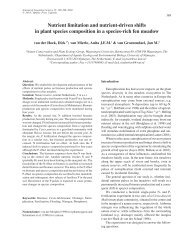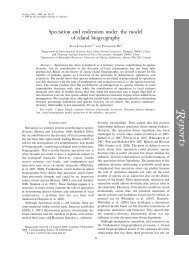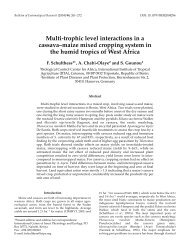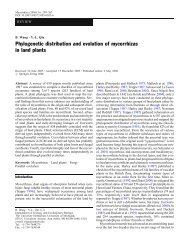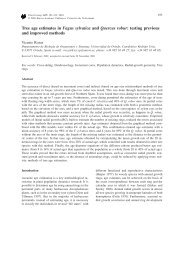- Page 2:
This page intentionally left blank
- Page 8: THE NAMES OF PLANTS FOURTH EDITION
- Page 12: Contents Preface to the first editi
- Page 18: Preface to the fourth edition This
- Page 22: The Names of Plants examples above.
- Page 26: The size of the problem ‘Man by h
- Page 30: The Names of Plants Jaskien sodky P
- Page 34: The Names of Plants which can be st
- Page 38: The Names of Plants detailed but hi
- Page 42: The Names of Plants elevation of th
- Page 46: The rules of botanical nomenclature
- Page 50: The Names of Plants most persistent
- Page 54: The Names of Plants Table 1 Flower
- Page 60: Table 4 to names ending with a vowe
- Page 64: The rules of botanical nomenclature
- Page 68: The rules of botanical nomenclature
- Page 72: The International Code of Nomenclat
- Page 76: also in our own horticultural liter
- Page 80: Glossary Ruscus. The significance o
- Page 84: Glossary absum different, distant,
- Page 88: Glossary Aciphylla Pointed-leaf, ak
- Page 92: Glossary Adina Crowded, adinoj (the
- Page 96: Glossary Afrotrilepis African-Trile
- Page 100: Glossary alaris -is -e winged, alar
- Page 104: Glossary alleghanensis -is -e from
- Page 108:
Glossary Amarygia the composite gen
- Page 112:
Glossary Amsonia for Charles Amson,
- Page 116:
Glossary Anemopaegma Wind-sportive,
- Page 120:
Glossary anthemoides Anthemis-like,
- Page 124:
Glossary aporo- without means of ac
- Page 128:
Glossary aren-, areba-, areni-, are
- Page 132:
Glossary armoricensis -is -e from B
- Page 136:
Glossary asperus -a -um rough, aspe
- Page 140:
Glossary atri-, atro- better-, dark
- Page 144:
Glossary Auxopus Different-stalk, a
- Page 148:
Glossary Bakerisideroxylon Engler
- Page 152:
Glossary basirameus -a -um much bra
- Page 156:
Glossary Beloperone Dart-clasp, bel
- Page 160:
Glossary biformis -is -e having two
- Page 164:
Glossary blepharopus fringed with a
- Page 168:
Glossary Boronia for Francesco Boro
- Page 172:
Glossary braun-blanquetii for Josia
- Page 176:
Glossary bruniifolius -a -um with c
- Page 180:
Glossary Bunium a name, bounion, us
- Page 184:
Glossary Caesalpinia for Andrea Cae
- Page 188:
Glossary calisaya Andean vernacular
- Page 192:
Glossary Calycophyllum Calyx-leaf,
- Page 196:
Glossary candelaris -is -e taper or
- Page 200:
Glossary caraguatus -a -um a S Amer
- Page 204:
Glossary Carpinus, carpinus the anc
- Page 208:
Glossary Catananche, catananche Dri
- Page 212:
Glossary cedroensis -is -e from Ced
- Page 216:
Glossary ceraseidos resembling (Pru
- Page 220:
Glossary Chamaebatia Dwarf-bramble,
- Page 224:
Glossary cheiro- hand-, hand-like-,
- Page 228:
Glossary chloophyllus -a -um having
- Page 232:
Glossary chrysodoron presenting gol
- Page 236:
Glossary cinnabari, cinnabarinus -a
- Page 240:
Glossary clavicornis -is -e having
- Page 244:
Glossary cocciferus -a -um, coccige
- Page 248:
Glossary coliandrus -a -um coriande
- Page 252:
Glossary complectens becoming entwi
- Page 256:
Glossary consobrinus -a -um cousin,
- Page 260:
Glossary cordiferus -a -um, cordige
- Page 264:
Glossary corymbiflorus -a -um with
- Page 268:
Glossary crenatifolius -a -um, cren
- Page 272:
Glossary Cryptantha Hidden-flower,
- Page 276:
Glossary cupuliferus -a -um bearing
- Page 280:
Glossary cylistus -a -um goblet- or
- Page 284:
Glossary Dactyloctenium Digitate-Ct
- Page 288:
Glossary daucifolius -a -um having
- Page 292:
Glossary delavayanus -a -um, delava
- Page 296:
Glossary Desmoschoenus Banded-Schoe
- Page 300:
Glossary didymophyllus -a -um havin
- Page 304:
Glossary diplostemonus -a -um havin
- Page 308:
Glossary dodec-, dodeca- twelve-, d
- Page 312:
Glossary Drimioposis resembling Dri
- Page 316:
Glossary e-, ef-, ex- without-, not
- Page 320:
Glossary elaphinus -a -um tawny, fu
- Page 324:
Glossary emeroides resembling emeru
- Page 328:
Glossary epidendroides resembling E
- Page 332:
Glossary Eriochrysis Golden-fleeced
- Page 336:
Glossary Eucrosia Well-fringed, eu-
- Page 340:
Glossary exchlorophyllus -a -um lac
- Page 344:
Glossary falklandicus -a -um from t
- Page 348:
Glossary ferrus -a -um sword-like,
- Page 352:
Glossary flagelliflorus -a -um flow
- Page 356:
Glossary Fontanesia, fontanesii for
- Page 360:
Glossary Fremontia, fremontii, Frem
- Page 364:
Glossary furfurascens becoming scur
- Page 368:
Glossary gamosepalus -a -um with a
- Page 372:
Glossary genuflexus -a -um kneeling
- Page 376:
Glossary glastifolius -a -um with w
- Page 380:
Glossary glyptodontus -a -um having
- Page 384:
Glossary gourianus -a -um from Gour
- Page 388:
Glossary grignonensis -is -e from G
- Page 392:
Glossary gymnocarpus -a -um with na
- Page 396:
Glossary Haematostemon Blood-thread
- Page 400:
Glossary haplocalyx having the sepa
- Page 404:
Glossary hecatophyllus -a -um many
- Page 408:
Glossary Helobiae Marsh-life, eloj-
- Page 412:
Glossary Hernandia for Francisco He
- Page 416:
Glossary hex-, hexa-, hexae- six-,
- Page 420:
Glossary hircinus -a -um of goats,
- Page 424:
Glossary homo- one and the same-, o
- Page 428:
Glossary Huegelia, huegelii, hugeli
- Page 432:
Glossary Hyeronima for Georg Hans W
- Page 436:
Glossary hypochrysus -a -um golden
- Page 440:
Glossary igniarius -a -um burning,
- Page 444:
Glossary incomparabilis -is -e beyo
- Page 448:
Glossary insiticius -a -um, insitit
- Page 452:
Glossary Ipomopsis Resembling-Ipomo
- Page 456:
Glossary ithypetalus -a -um having
- Page 460:
Glossary jemtlandicus -a -um from J
- Page 464:
Glossary Kalmia, kalmianus -a -um f
- Page 468:
Glossary kishtvariensis-is -e from
- Page 472:
Glossary Kyllingia, Kyllingiella fo
- Page 476:
Glossary lagopides resembling (Copr
- Page 480:
Glossary larpentae, larpentiae for
- Page 484:
Glossary ledifolius -a -um with Led
- Page 488:
Glossary Leptogramma Slender-lined,
- Page 492:
Glossary libero- book-; bark-, libe
- Page 496:
Glossary lingularis -is -e, lingula
- Page 500:
Glossary loderi for Gerald Loder (L
- Page 504:
Glossary loudonii for John Claudius
- Page 508:
Glossary lycaonicus -a -um from the
- Page 512:
Glossary macropodus -a -um, macropu
- Page 516:
Glossary mallo-, -mallus -a -um fle
- Page 520:
Glossary marianus -a -um for the Vi
- Page 524:
Glossary mays from the Taino/Mexica
- Page 528:
Glossary melanophloeus -a -um black
- Page 532:
Glossary meridianus -a -um, meridio
- Page 536:
Glossary Micromeles Small-apple, mi
- Page 540:
Glossary mitriformis -is -e, mitrae
- Page 544:
Glossary monospermus -a -um single-
- Page 548:
Glossary mughus, mugo an old Italia
- Page 552:
Glossary myagroides resembling Myag
- Page 556:
Glossary napaeus -a -um of woodland
- Page 560:
Glossary Neohyptis New-Hyptis Neoli
- Page 564:
Glossary nigri-, nigro- black-, dar
- Page 568:
Glossary novae-hiberniae from New I
- Page 572:
Glossary obscissus -a -um with a sq
- Page 576:
Glossary officinalis -is -e, offici
- Page 580:
Glossary oncogynis -is -e with a wa
- Page 584:
Glossary oreadoides resembling (Mar
- Page 588:
Glossary oshimensis -is -e from Osh
- Page 592:
Oxyspora Sharp-seed, ocu-spora (the
- Page 596:
Glossary pampini- tendrillar-, tend
- Page 600:
Glossary parcifrondiferus -a -um be
- Page 604:
Glossary paucicostatus -a -um with
- Page 608:
Glossary pelviformis -is -e shallow
- Page 612:
Glossary periacanthus -a -um with r
- Page 616:
Glossary Peumus from a Chilean vern
- Page 620:
Glossary Phoenix Phoenician, foinic
- Page 624:
Glossary pigrus -a -um sluggish or
- Page 628:
Glossary Pittosporum Tar-seed, pitt
- Page 632:
Glossary pleiogonus -a -um very ang
- Page 636:
Glossary poeppigianus -a -um, poepp
- Page 640:
Glossary pomeridians, pomeridianus
- Page 644:
Glossary -pous -foot, -stalk, -stal
- Page 648:
Glossary proboscoides, proboscoideu
- Page 652:
Glossary pseudoambiguus false or ps
- Page 656:
Glossary pteno- deciduous-, pthnoj
- Page 660:
Glossary Punica from a name, malum
- Page 664:
Glossary Pyxidanthera Lidded-box-an
- Page 668:
Glossary racemosus -a -um having ra
- Page 672:
Glossary re- back-, again-, against
- Page 676:
Glossary resinifer -era -erum beari
- Page 680:
Glossary rhizomatus -a -um with rhi
- Page 684:
Glossary Rivina, riviniana for Augu
- Page 688:
Glossary rubescens, rubidus -a -um
- Page 692:
Glossary sabaneticus -a -um from Sa
- Page 696:
Glossary saltitans jumping (twitchi
- Page 700:
Glossary sarmentaceus -a -um, sarme
- Page 704:
Glossary scardicus -a -um from the
- Page 708:
Glossary scillifolius -a -um Scilla
- Page 712:
Glossary Scutellinia Small-bowl, sc
- Page 716:
Glossary semiplenus -a -um half-dou
- Page 720:
Glossary serra, serra-, -serras saw
- Page 724:
Glossary siehei for Walther Siehe (
- Page 728:
Glossary Skimmia from a Japanese na
- Page 732:
Glossary soulangiana, soulangii for
- Page 736:
Glossary spina-christi Christ’s t
- Page 740:
Glossary staticifolius -a -um with
- Page 744:
Glossary stoloniflorus -a -um flowe
- Page 748:
Glossary suaveolens sweet-scented,
- Page 752:
Glossary Succowia for Georg Adolph
- Page 756:
Glossary Synsepalum, synsepalus -a
- Page 760:
Glossary tanguticus -a -um of the T
- Page 764:
Glossary teino- elongate, stretch,
- Page 768:
Glossary tertio- third-, tertius te
- Page 772:
Glossary Thaumatocaryon Strange-nut
- Page 776:
Glossary Thuarsea, thouarsii for Lo
- Page 780:
Glossary titano- chalk-, lime-, tit
- Page 784:
Glossary Trachycalymma Rough-coveri
- Page 788:
Glossary Triceratorrhynchus Three-h
- Page 792:
Glossary Trilisa Tripled, trilic (t
- Page 796:
Glossary Triuris Three-tailed-one,
- Page 800:
Glossary tumidi-, tumidus -a -um sw
- Page 804:
Glossary ulmariae of meadow sweet,
- Page 808:
Glossary Urceolina Urn-like-one, di
- Page 812:
Glossary Valerianella diminutive of
- Page 816:
Glossary velutipes with a velvety s
- Page 820:
Glossary vexans annoying, wounding,
- Page 824:
Glossary viscatus -a -um clammy, vi
- Page 828:
Glossary walkeri, walkerianus -a -u
- Page 832:
Glossary Willkommia for Heinrich Mo
- Page 836:
Glossary xanthoxyloides resembling
- Page 840:
Glossary Zanonia for Giacoma Zanoni
- Page 844:
Figures the pistil or gynoecium sti
- Page 848:
(a) (b) (c) rachis (d) bract Figure
- Page 852:
(d) (a) (c) (b) (e) Figures Figure
- Page 856:
(a) (b) (c) (e) (g) Figures Figure
- Page 860:
Bibliography Adanson, M. 1763-4 Fam
- Page 864:
Bibliography Styles, B. T. (ed.) 19
- Page 868:
epithets commemorative see commemor







